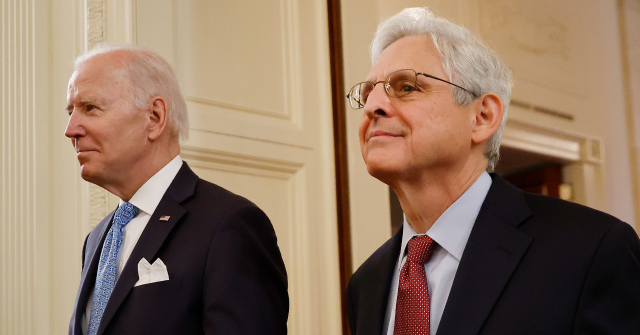

President Joe Biden and Attorney General Merrick Garland may face tough questions after Thursday’s release of the testimony of an IRS whistleblower, which was released by the U.S. House Ways and Means Committee.
Republicans released transcripts of two whistleblowers, one of whom said he had seen evidence that Joe Biden was present when his son, Hunter, attempted to pressure a Chinese investor to send them millions of dollars. The whistleblower, IRS Criminal Supervisory Special Agent Gary A. Shapley Jr., also said that the Department of Justice had interfered in the effort to investigate Hunter Biden for tax crimes — contrary to Garland’s claims.
Though the mainstream media largely ignored the revelations, they prompt several questions that will, in some way or another, have to be answered by Garland — and perhaps Biden, too, if only on the campaign trail.
Here are five key questions:
1. Was Joe Biden in the room when Hunter Biden pressured a Chinese investor to send money? Biden has said, numerous times, that he has never discussed his family’s business interests. But Shapley said:
[W]e obtained a July 30th, 2017, WhatsApp message from Hunter Biden to Henry Zhao, where Hunter Biden wrote: “I am sitting here with my father and we would like to understand why the commitment made has not been fulfilled. Tell the director that I would like to resolve this now before it gets out of hand, and now means tonight. And, Z, if I get a call or text from anyone involved in this other than you, Zhang, or the chairman, I will make certain that between the man sitting next to me and every person he knows and my ability to forever hold a grudge that you will regret not following my direction. I am sitting here waiting for the call with my father.”
That message, together with other evidence, could have provided a basis for a search warrant of Joe Biden’s home, Shapley said — but Assistant U.S. Attorney Lesley Wolf blocked efforts to obtain one, based on “optics.”
Shapley said that the Department of Justice denied other efforts to investigate the Bidens. But Joe Biden can still be asked whether he, in fact, was present — or whether his son simply lied to extort a foreign investor.
2. Did Merrick Garland block a request to appoint a special counsel in the Hunter Biden case? Merrick Garland told Congress that U.S. Attorney David Weiss in Delaware was given total freedom in pursuit of the Hunter Biden investigation, and that there was no involvement from the U.S. Department of Justice in Washington, D.C. However, Shapley told Congress that Garland rejected a request from Weiss to appoint a special counsel, after the U.S. Attorney for the District of Columbia refused to prosecute Hunter Biden there:
From March 2022 through October 7th, 2022, I was under the impression that, based on AG Garland’s testimony before Congress and statements by U.S. Attorney Weiss and prosecutors, that they were still deciding whether to charge 2014 and 2015 tax violations.
However, I would later be told by United States Attorney Weiss that the D.C. U.S. Attorney would not allow U.S. Attorney Weiss to charge those years in his district. This resulted in United States Attorney Weiss requesting special counsel authority from Main DOJ to charge in the District of Columbia. I don’t know if he asked before or after the Attorney General’s April 26th, 2022, statement, but Weiss said his request for that authority was denied and that he was told to follow DOJ’s process.
That process meant no charges would ever be brought in the District of Columbia, where the statute of limitations on the 2014 and ’15 charges would eventually expire. The years in question included foreign income from Burisma and a scheme to evade his income taxes through a partnership with a convicted felon. There were also potential FARA issues relating to 2014 and 2015. The purposeful exclusion of the 2014 and 2015 years sanitized the most substantive criminal conduct and concealed material facts.
Garland needs to explain why he denied a request for a special counsel, if Weiss was indeed given free rein.
3. Did Merrick Garland mislead Congress about Weiss’s ability to file cases in any state? In March, Garland told the Senate that U.S. Attorney Weiss would be able to bring charges against Hunter Biden, if necessary, outside of Delaware.
AG Garland’s testimony in response to these @ChuckGrassley questions is directly contradicted by the facts. https://t.co/JyI55bDInw
— Jason Foster (@JsnFostr) June 22, 2023
But that did not happen, and Shapley testified that Weiss had been denied the ability to bring such charges in other jurisdictions, both in D.C. and in the Central District of California:
Around this time, there began to be discussions of the fact that the remaining tax years, 2016, ’17, ’18 and ’19, needed to be brought in the Central District of California. There was no explanation as to why, after being declined in D.C. for 2014 and 2015, that it took until mid-September 2022 to present the case to the Central District of California United States Attorney’s Office.
Prosecutors stated that they presented the case to the Central District of California in mid-September. That happened to correspond with the confirmation of the President Biden appointee to the United States Attorney, Martin Estrada. The case agent and I asked to participate in that presentation, but it was denied.
Garland will almost certainly be asked to explain the discrepancy between his testimony, and that of Shapley.
4. Did the Department of Justice slow-walk the Hunter Biden investigation to help Joe Biden? Shapley testified that career officials at the Department of Justice deliberately stalled the investigation of Hunter Biden’s tax violations so that they would hit the “window” before the 2020 presidential election and therefore have an excuse not to act, presumably to help Biden’s chances of defeating President Trump:
Yet, after former Vice President Joseph Biden became the presumptive Democratic nominee for President in early April 2020, career DOJ officials dragged their feet on the IRS taking these investigative steps.
By June 2020, those same career officials were already delaying overt investigative actions. This was well before the typical 60- to 90-day period when DOJ would historically stand down before an election. It was apparent that DOJ was purposely slow-walking investigative actions in this matter.
This would be another example of the DOJ being politicized under Trump — not to help him, but to hurt him.
5. Did the Department of Justice obstruct justice by tipping off the Bidens? Shapley testified that Assistant U.S. Attorney Wolf warned Hunter Biden’s attorneys about potential aspects of the inquiry. In one case, she allegedly tipped them off about a possible search of Hunter Biden’s business documents:
On December 10th, 2020, the prosecutorial team met again to discuss the next steps. One piece of information that came out of the day of action was that Hunter Biden vacated the Washington, D.C., office of Owasco. His documents all went into a storage unit in northern Virginia. The IRS prepared an affidavit in support of a search warrant for the unit, but AUSA Wolf once again objected.
My special agent in charge and I scheduled a call with United States Attorney Weiss on December 14th just to talk about that specific issue. United States Attorney Weiss agreed that if the storage unit wasn’t accessed for 30 days we could execute a search warrant on it.
No sooner had we gotten off the call then we heard AUSA Wolf had simply reached out to Hunter Biden’s defense counsel and told him about the storage unit, once again ruining our chance to get to evidence before being destroyed, manipulated, or concealed.
Wolf also allegedly stopped prosecutors from asking a witness about the infamous email, found on Hunter Biden’s laptop, that 10% of a joint venture with a Chinese government-linked company was to be held for the “big guy”:
Weiss was in and out for the rest of the meeting, but it went downhill from there. We shared with prosecutors our outline to interview Hunter Biden’s associate, Rob Walker. Among other things, we wanted to question Walker about an email that said: “Ten held by H for the big guy.” We had obvious questions like who was H, who the big guy was, and why this percentage was to be held separately with the association hidden.
But AUSA Wolf interjected and said she did not want to ask about the big guy and stated she did not want to ask questions about “dad.” When multiple people in the room spoke up and objected that we had to ask, she responded, there’s no specific criminality to that line of questioning.
Shapley also said that “a group of people very close to President Biden and Hunter Biden” were tipped off by the FBI about being interviewed by investigators, meaning that most potential witnesses could not be interviewed.
Joel B. Pollak is Senior Editor-at-Large at Breitbart News and the host of Breitbart News Sunday on Sirius XM Patriot on Sunday evenings from 7 p.m. to 10 p.m. ET (4 p.m. to 7 p.m. PT). He is the author of the new biography, Rhoda: ‘Comrade Kadalie, You Are Out of Order’. He is also the author of the recent e-book, Neither Free nor Fair: The 2020 U.S. Presidential Election. He is a winner of the 2018 Robert Novak Journalism Alumni Fellowship. Follow him on Twitter at @joelpollak.





